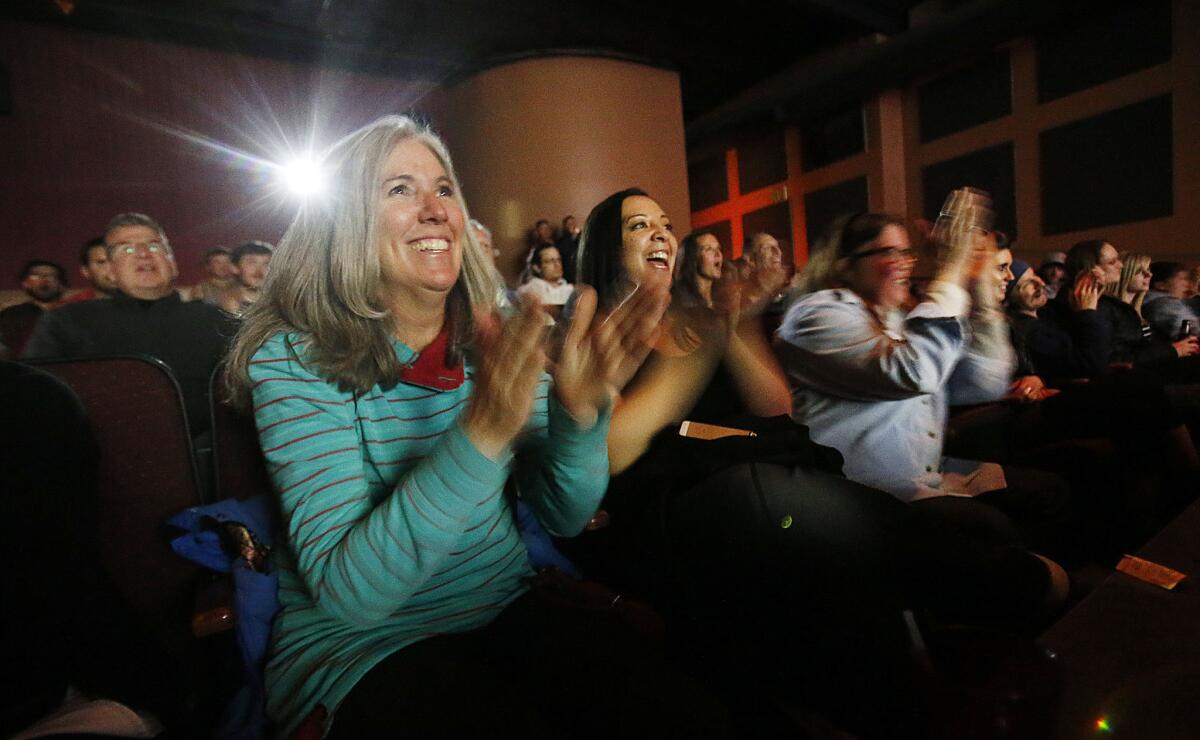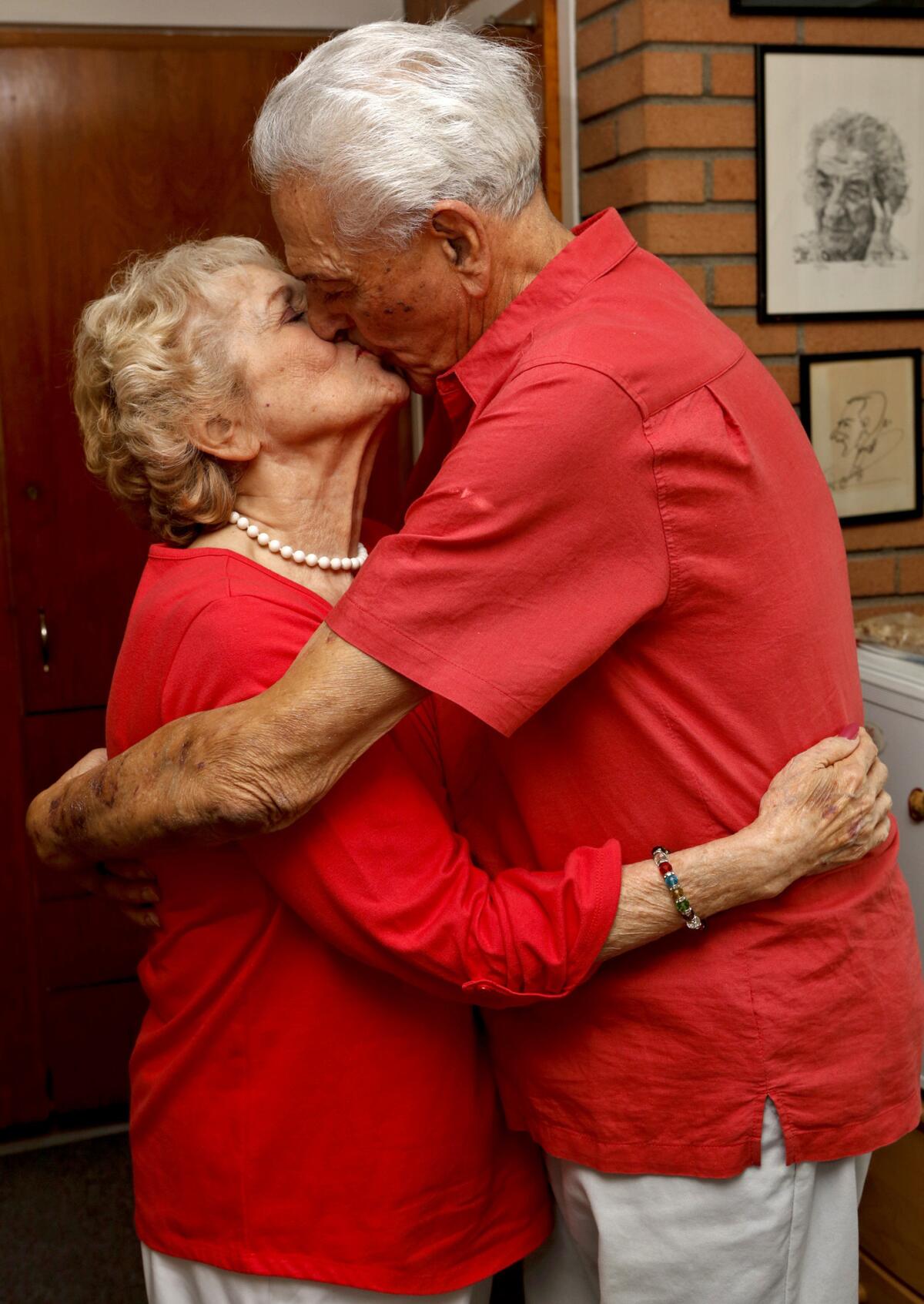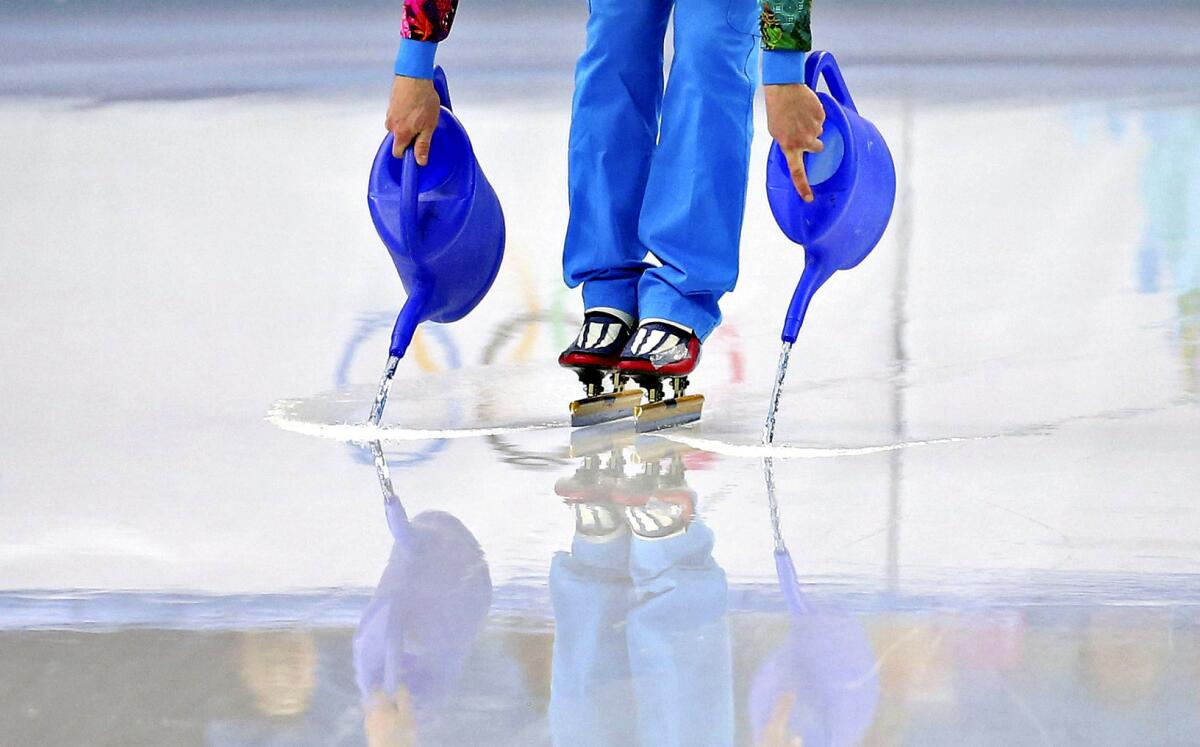Sochi Olympics: Families cheer athletes from near and far
For parents who have nurtured athletes’ Winter Olympics dreams, the choice to stay home or head to the Games can be as hard as a slopestyle trick.
- Share via
A bright sun shone on the Caucasus Mountains as snowboarders flew one after another down the hill.
It was the men's slopestyle final on the second day of the Sochi Olympics. The competitors spun across metal rails painted red against the white snow, then launched themselves off steep jumps, hoping to impress the judges.
Stephen and Carol Ann Kotsenburg had dreamed of this moment for years, ever since their youngest son, Sage, began to show promise on the slopes.
Driving him to practice sessions, accompanying him to contests, they had envisioned "this wild ride," as they called it, ending with Sage at the Games and them cheering from the stands.
"You couldn't hold us back," Carol Ann said.
Last month, when he qualified for the U.S. team, the family immediately bought plane tickets to Sochi. But suicide bombers had struck in nearby Volgograd and the news was filled with speculation of terrorist attacks at the 2014 Winter Games.
The 20-year-old sat his parents down to say that he was worried about their safety.
"I was like, hey, if you guys could just kind of hang out at home," he recalled telling them. "It's like better for me in my mind."
So the Kotsenburgs — who did not share their son's fear about traveling to Russia — watched his Olympic moment from 6,000 miles away, staying up past midnight at their home in the Utah mountains.
"For his peace of mind, we decided to back off," Carol Ann said. "It was one of the hardest things I've ever done."

No one makes it to the Olympics without a lifetime of help — and sacrifice — from family.
Kaitlyn Farrington's parents sold cows to help pay for her snowboarding. Emily Scott's father got her to speedskating practices while working and raising two girls largely on his own because her mother struggled with drug addiction.
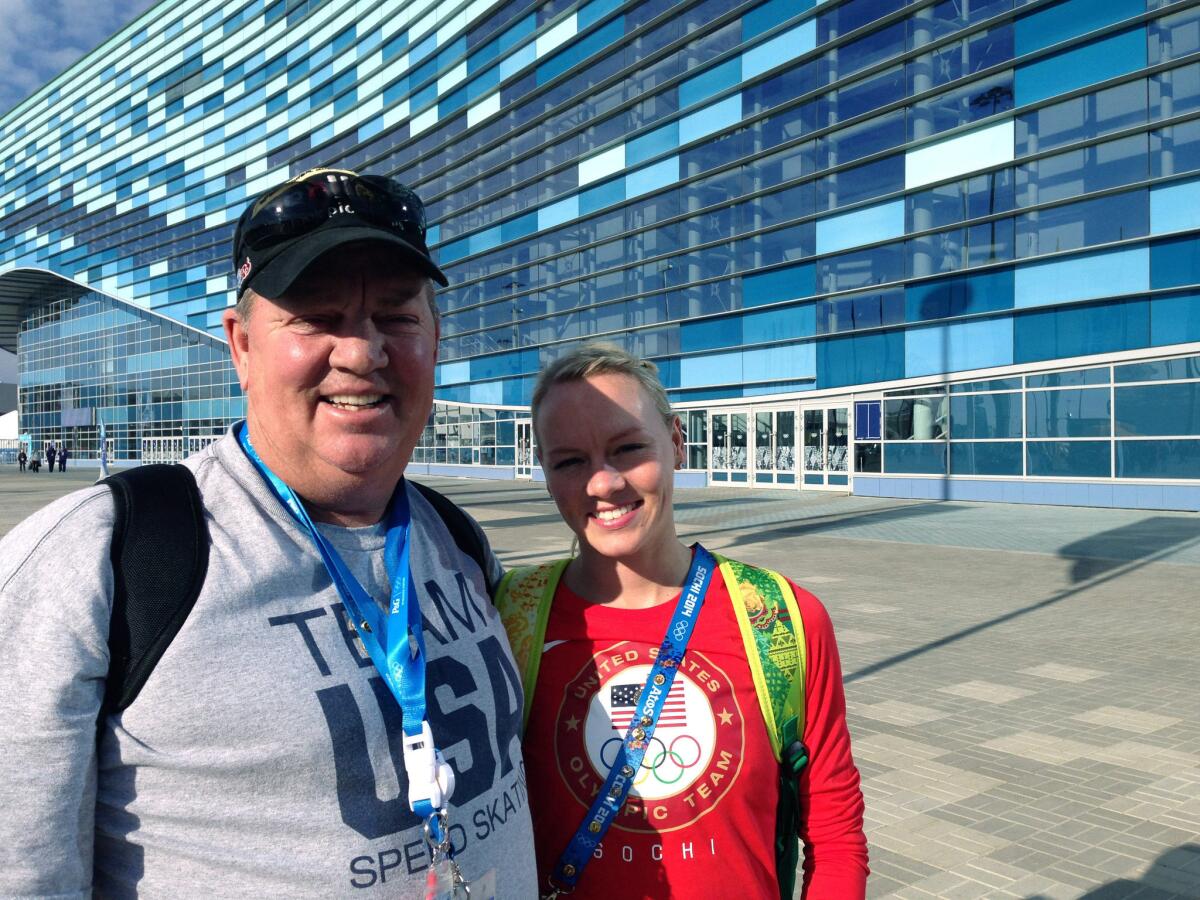
U.S. short-track speedskater Emily Scott is joined at the Winter Olympics by her father, Craig. The 24-year-old says she couldn't imagine competing in Sochi without her father there: "This has been our dream." (Beth Harris / Associated Press) More photos
The 24-year-old American could not imagine competing in Sochi without her father there, saying: "This has been our dream."
But having family in the stands can be a mixed blessing.
Some athletes say that, at this crucial moment in their careers, they cannot help worrying about their families getting around and staying safe in Russia. Others don't want to feel guilty about not spending more time together.
Skeleton racer Matt Antoine set ground rules before he and his family departed from the U.S.
"I told them to leave me out of the program as much as possible so I can focus on what I need to do," he said, days prior to winning a bronze medal. "I want them here but it's something they have to plan and do on their own."
The potential for distraction seemed too great for Canadian skier Ben Thomsen, making his first trip to the Games. He asked his parents to stay home.
"Even though you think it's a good thing," he said, "it can take you away from your training routine."

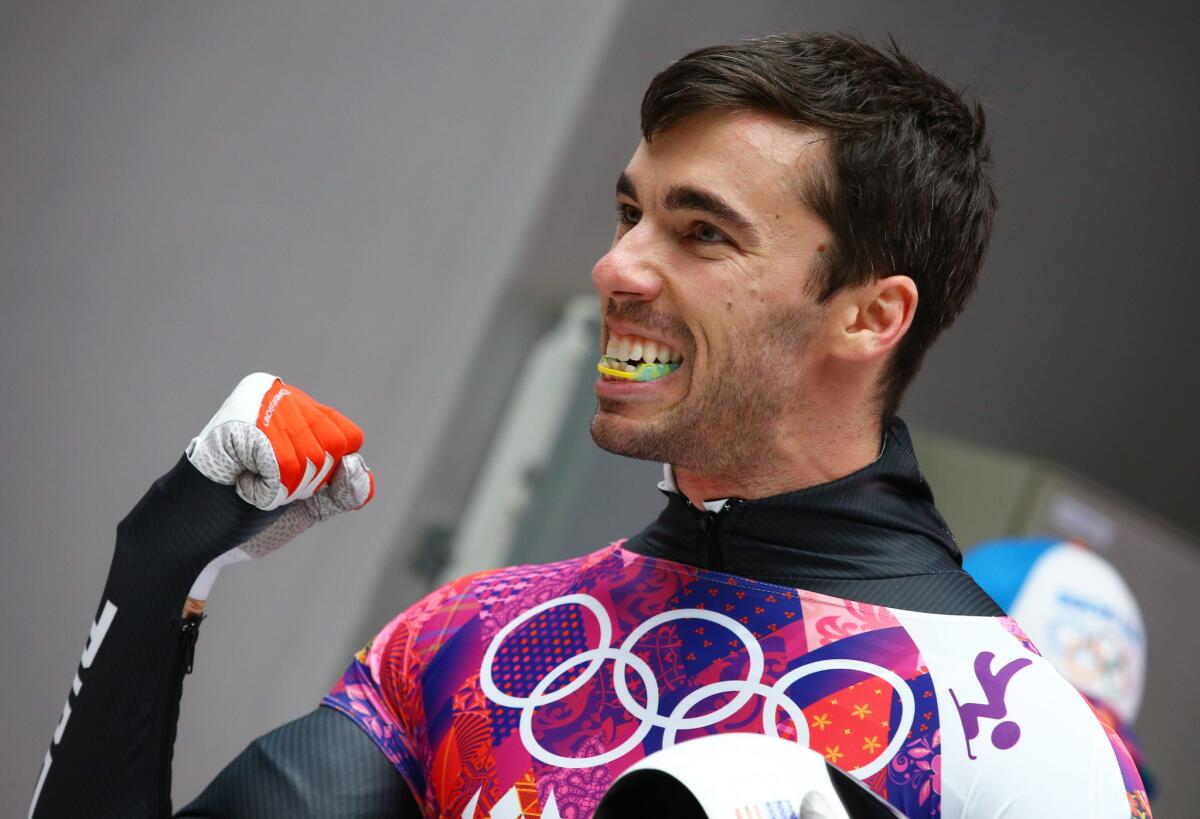
U.S. skeleton racer Matthew Antoine celebrates in Sochi. Though his family joined him in the Winter Games, he made sure to set ground rules to limit distractions: "I told them to leave me out of the program as much as possible so I can focus on what I need to do." He went on to win the bronze medal. (Jens Buettner / EPA) More photos
Carol Ann recalls her son starting the conversation like this: "You know how much I love you guys."
Sage did not tell his parents to stay away; he left the decision up to them. But he made his concerns clear and wondered if he would be able to concentrate.
The young man is normally carefree, his conversational style marked by the expected boarder's vernacular with recurrences of "awesome" and "stoked" and "random."
"For him to come to us, that was a huge thing," his mother said of their talk. "He's not like that."
When the Olympics began, Sage tried to keep his parents in the loop, launching a series of texts the moment he arrived in Sochi. The messages eased their disappointment.
"He was being Sage … relaxed, having fun," Stephen said. "I could sense his focus."
The slopestyle final streamed live online in the middle of the night. Moments before, Sage telephoned Utah to ask his older brother, Blaze, for advice on a trick.
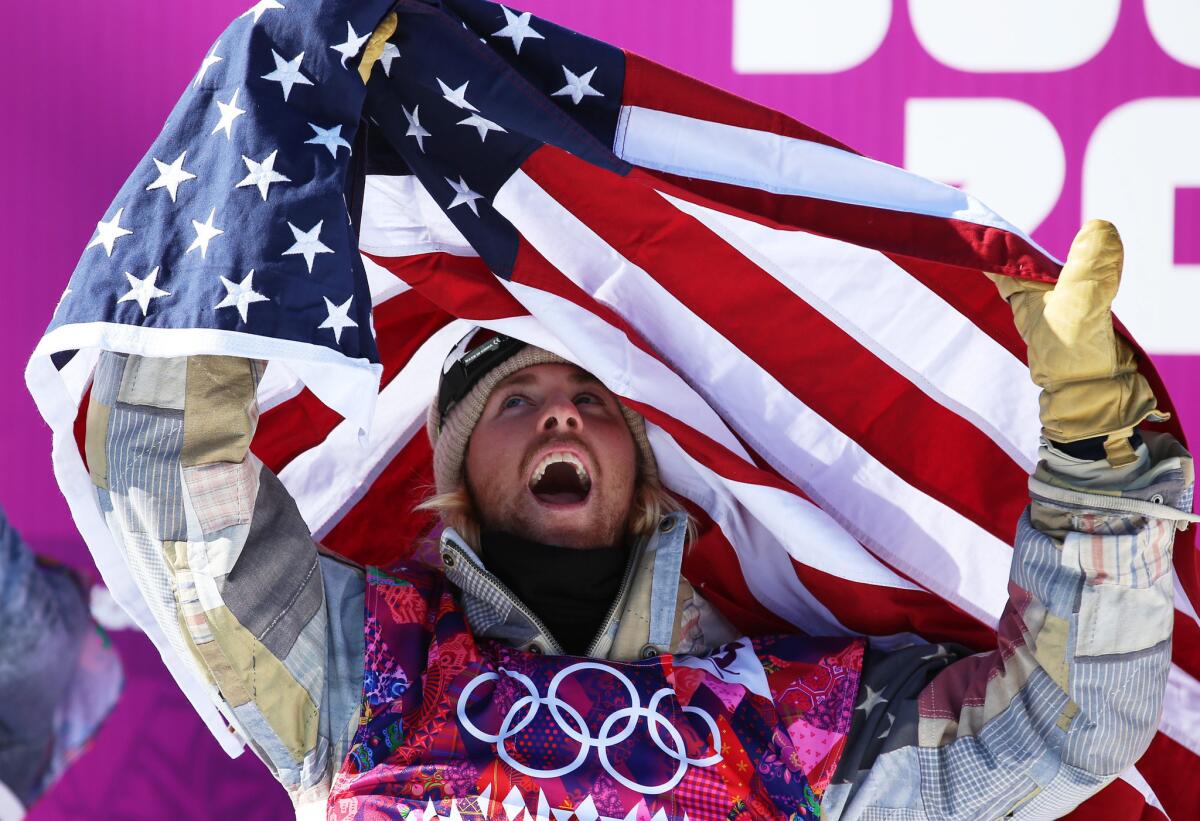
Sage Kotsenburg celebrates his snowboard slopestyle gold medal win. Worried about his parents' safety, he had asked them to stay home. "For his peace of mind, we decided to back off," says his mom, Carol Ann. "It was one of the hardest things I've ever done." (Jens Buettner / EPA) More photos
Stephen and Carol Ann were too nervous to watch the event together. He sat in the kitchen and she was in the bedroom when their son improvised a maneuver — a backside 1620 Japan — to earn gold.
The result validated all those years of practice and made his parents feel like staying home had been the right choice.
Sage soon called them to share the victory. He said: "It was the coolest feeling ever, hearing their voices."
Though dawn was approaching in Utah, the Kotsenburgs had no intentions of going to bed, not with the medals ceremony coming up.
Carol Ann watched her son step up to the podium, her joy tempered by another emotion.
I still haven't hugged him, she thought.

The Olympic halfpipe can be a hazardous proposition, riders shooting straight up off the vertical walls, soaring high above the hard-packed snow. When they finally reach the end of the run, there is another challenge — a gantlet of cameras and reporters known as the "mixed zone."
We want her to experience this on her own. Away from Mom and Dad.”— Gary Farrington
Finishing a preliminary heat, Kaitlyn Farrington stopped short of the glut to search for familiar faces. It was a comfort having family in the crowd.
"Mom," she called out. "Dad."
Her parents stood on the other side of a low fence, waving laminated pictures of her.
From the start of the Games, the family had sufficed with waving to each other and blowing kisses. Gary Farrington and Suz Locke were determined not to impose on their daughter's big adventure.
"We want her to experience this on her own," Gary said. "Away from Mom and Dad."
The Thomsen family kept even more distance. Ben's parents coach ski racing and helped shape his career, especially in the early days.

Halfpipe snowboarding gold medalist Kaitlyn Farrington celebrates her win. It was a comfort to have her mom and dad in the crowd at Sochi, though they made sure to keep their distance. (Javier Soriano / AFP/Getty Images) More photos
His mother has always wondered if that puts more pressure on him because they can spot his technical flaws, the tiny mistakes that cost precious tenths of a second. When Ben began competing on the elite level, he stopped communicating with them the week of big races.
"That's the way it is," Shelley Thomsen said from her home in Invermere, British Columbia, at the edge of the Canadian Rockies. "It would be nice to have more contact, but I respect it and get it."
The 26-year-old Thomsen finished 19th in the downhill and, according to the Canadian ski team, left Russia soon afterward.
"Did he?" Shelley asked. "I've sent an email and tried his phone."

Weather delayed the flight, so Salt Lake City International Airport was mostly empty when Sage landed around midnight.
Fellow passengers wanted to take snapshots with him and touch his medal. Airport employees came running over as he made his way through the terminal.
Everyone wanted to share in the moment”— Stephen Kotsenburg
About 15 family and friends waited at baggage claim.
"It was really a neat thing for us to watch," his father said. "Everyone wanted to share in the moment."
The group drove to a Mexican restaurant that stays open late. There was lots of excitement and chatter, and no end to the questions.
An exhausted Sage patiently recounted his experience in Sochi. Carol Ann stayed out of the mix, content to watch.
"I wasn't exactly sitting near him," she said. "I was just glad that he was home."
Her big moment had already come. At the airport, Sage had sought her out and wrapped her in a hug.
Follow David Wharton(@LATimesWharton) on Twitter
Follow @latgreatreads on Twitter
More great reads
Restaurant goes belly up, but resident fish swim on
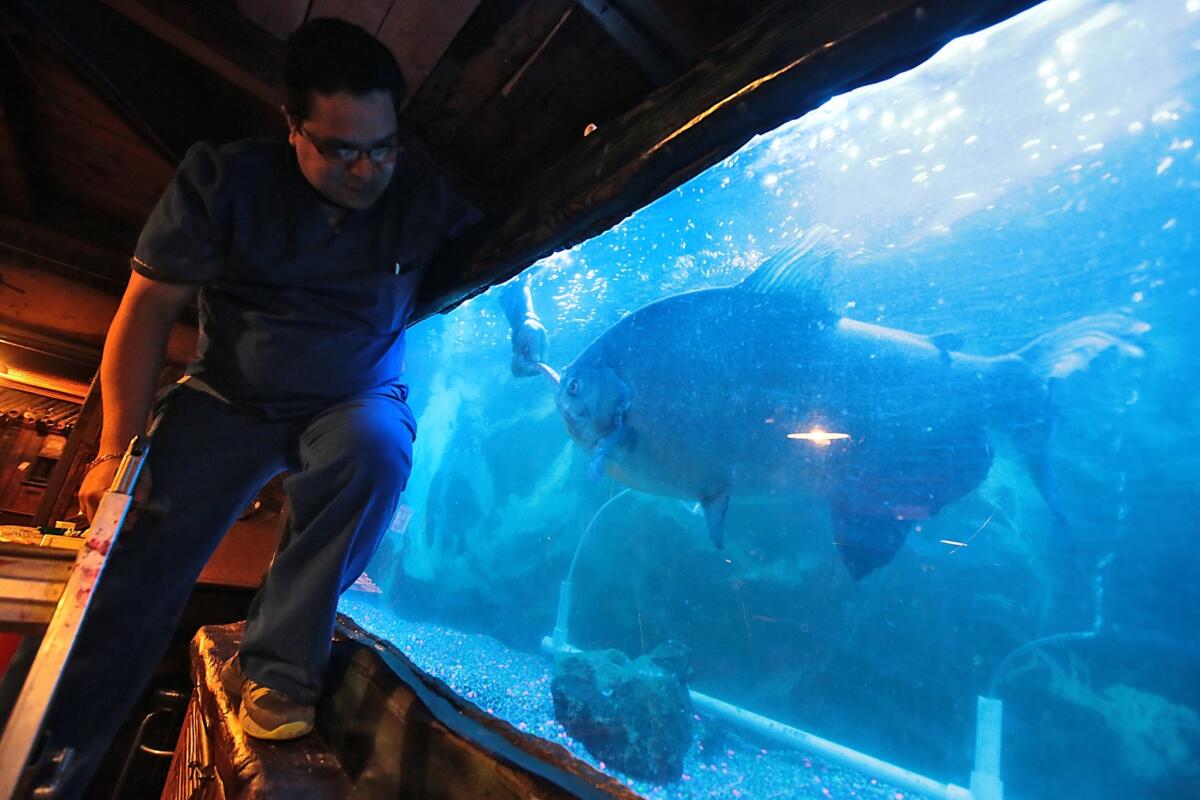
He's like the spirit of the tiki magic that we all want to save.”
Go beyond the scoreboard
Get the latest on L.A.'s teams in the daily Sports Report newsletter.
You may occasionally receive promotional content from the Los Angeles Times.
